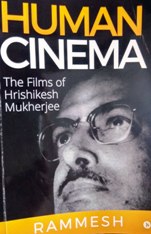|
|
||
|
Pro Tools
FILMFESTIVALS | 24/7 world wide coverageWelcome ! Enjoy the best of both worlds: Film & Festival News, exploring the best of the film festivals community. Launched in 1995, relentlessly connecting films to festivals, documenting and promoting festivals worldwide. Sorry for the interruption, we needed to correct and upgrade some modules. Working on a new website. For collaboration, editorial contributions, or publicity, please send us an email here. You need for put your full detail information if you want to be considered seriously. Thanks for understanding. User login |
Siraj SyedSiraj Syed is the India Correspondent for FilmFestivals.com and a member of FIPRESCI, the International Federation of Film Critics. He is a Film Festival Correspondent since 1976, Film-critic since 1969 and a Feature-writer since 1970. He is also an acting and dialogue coach. @SirajHSyed  Human Cinema—The Films of Hrishikesh Mukherjee: Highs and lows in the career of the humane ‘econo-miser’
Human Cinema—The Films of Hrishikesh Mukherjee: Highs and lows in the career of the humane ‘econo-miser’ K.V. Rammesh is a business manager by profession, and his passions are 3M—not the company, rather movies, music and military history. He was also part of a group called Rewind that has chronicled mainly film music in such detail that it is scary to the uninitiated. When he wanted to enroll for my workshop course in Announcing, Broadcasting, Compèring and Dubbing (ABCD) and told me that he had a great passion for Hindi films and Hindi film music, I was sceptical. Look at his picture on the back cover and you will know why, for he did not look much different 20 years ago. Twenty years later, he re-introduced himself at a Rewind event and reminded me about my erroneous assumption that movies and music might not really be his cup of tea. That is when I discovered that it is not only his cup of tea, but, coffee and all other beverages combined. The military history is a new one. A year-and-a-half down the line, he sent me by courier a book with the title Human Cinema, his tribute to one of the greatest directors of Hindi cinema, Hrishikesh Mukherjee.
Hrishikesh Mukherjee was almost a neighbor and lived five blocks away from my humble abode in Bandra, suburban Mumbai. I knew him, having met him and attended his shooting for the TV serial Hum Hindustani, which was shot largely at his bungalow. How I narrowly missed being cast in one of his projects is a story that I will append after this review, but let us begin by stating that he worked mainly in cinema and made 42 films in 42 years, 1957 (Musafir) to 1998 (Jhooth Bole Kauwa Katey), while a 43rd film remained unreleased (Lathi, 1988). The book is not a biography, and Mukherjee’s personal life is almost untouched. It follows the pattern of a film title, followed by an in-depth synopsis and then an analysis, almost like a critique. Rammesh, the music-maniac that he is, takes pains to list almost all the songs in each film, along with comments and their origins from raags to Bengali roots. He is obviously in awe of the man and his craft, but that does not come in the way of his being disappointed with the bad films made by the competent genius. Apparently, he has seen most of these films several times each, before putting pen to paper. A fan, after all, has the right to feel let down, as Rammesh does. And yet, rarely does he condemn any film roundly, trying to find some good in the movie. This is partly inspired by Mukherjee himself, who created characters that had a lot of good in them or, if they were evil, turned new leaves when faced with a dilemma. Although the title uses the word Human, I wish he had used an extra ‘e’ at the end and called it Humane. Cinema is always human, sometimes close to reality, sometimes fiction and fantasy, but it is always human. Humane would suggest that he finds compassion in his characters and taps that compassion to further the narrative. One clever word occurs time and again—econo-miser. Mukherjee’s ability to make films on a shoe-string budget and have editing points in his mind during shooting, to avoid exposing extra footage and take unnecessary shots, was well-known. He also had the knack of making films on a shoe-string budget, even with stars. But when he resorts to using the same title music in as any as four films, Rammesh cannot but help call him an econo-miser.
It is amply clear that Hrishida (da is a suffix used to denote big brother in Bengali, Mukherjee’s mother tongue)’s best film is Satyakam, both in his own assessment and in the analysis by Rammesh. We learn that the story was based on a novel written by a friend of his who was an engineer and faced a moral dilemma when confronted with corruption at a time when he needed the money, although he was fiercely honest in real life. Anand, we discover, is about Raj Kapoor and Hrishida, for Raj Kapoor was ailing and he used to call Hrishida "Babumoshai" (Bengali friendly term for ‘Sir’/friend, moshai being an abbreviated form of Mahashai)). And no, Abhimaan was not about Amitabh and Jaya. Read the book to know who inspired this film. Anupama was a true story too, about a cousin of Hrishida, whose mother died during childbirth and her father never forgave the girl for that occurrence. In his early films, he had stars like Dilip Kumar, Raj Kapoor, Dev Anand and Dharmendra. Later years saw him work with Amitabh Bachchan, Rajesh Khanna and Amol Palekar. Mukherjee was mentored by Bimal Roy, who coaxed him into becoming an editor as well as writing Do Bigha Zamin, and owed his directorial debut to Dilip Kumar, who convinced him to direct Musafir, wherein he worked for free. Raj Kapoor and Dilip Kumar worked with him till the 70s. Anari remains his most successful film with Raj Kapoor and Musafir with Dilip Kumar, was a landmark. Dharmendra did Anupama, Satyakam, Guddi, Majhli Didi and Chupke Chupke. Amitabh was in Mili, Alaap, Chupke Chupke, Namak Haram, Jurmana and Bemisal. Golmaal is the film that survives a cult classic, even in 2018, with Chupke Chupke not far behind. Among leading ladies, he worked with a whole range of actresses in subjects that had very strong female characters, even in titular roles: Leela Naidu (Anuradha), Suchitra Sen (Musafir), Jaya Bhaduri-Bachchan (Guddi, Abhiman, Mili, Alaap), Rekha (Khubsurat, Alaap, Jhoothi), Sharmila Tagore (Anupama), Meena Kumari (Majhli Didi)…and so many more. (The mentions are not exhaustive). Editing and proof-reading leave a lot to be desired, though they never come in the flow of the text. Phrases are often repeated in the same paragraph or on the next page and Hindi words are not properly transcripted into their English (Roman) rendering. A filmography is attached at the end of the 243 page-book, as is an interview conducted with Hrishida by Lalit Mohan Joashi, in 2000, after he had won the Dadasaheb Phalke Award, India’s highest civilian honour for outstanding service to the film industry. A Notion Press publication, the paper-back carries a price tag of Rs. 350, money well spent. It is easy reading, with words like ‘cloying’, ‘excoriated’ and ‘truculent’ occurring on just a few occasions, and far between. Notion Press has also published a collection of short stories by Rammesh, titled City Life. --------------------------------------------------------------------------------------------------------------------------------------------------------------------------------------------------------- Hrishida and I My first few meetings with Hrishida were during the shooting of Hum Hindustani, as Editor of the magazine, TV&Video World. During one such meeting, I mentioned to him that I would be delighted if he found a role for me in any of his upcoming projects. He agreed to consider my request, and that was reward enough, for the moment. This was in 1988. I had already acted in a few serials and films, but the big break was still awaited. After Hum Hindustani, we met the staging of a play, where he was among the audience. This was some two years later, and I was pleasantly surprised that he not only remembered my face, but addressed me as "Syed Saahab", a term I found terribly embarrassing. At the next meeting, he recalled the play, and even remembered where I was seated. But still no role. Meanwhile, I bagged the role of Mahamantri (Prime Minister) Sushen in the serial Chanakya. As part of the preparations for the role, I had to learn horse-riding and ended up with a broken rib. For the character, I would also have to get my head shaved and a shikha (short pony-tail) was stuck at the back of my head. It was a very irritable feeling, but good roles call for major sacrifices. On that first night, I was shaven bald and a shikha was stuck, but no shooting took place. It was postponed till the next night, because the earlier portion could not be completed. I came home in the early hours of the morning, weary and itchy. At 8 am, I woke up to a phone call. It was from Hrishikesh Mukherjee’s office. My much awaited role had materialised, and we were to shoot the next morning! I was called at 10 am to discuss the details. Imagine my excitement at a dream being realised after about three years! I felt elated. And then realisation dawned on me. My head! My bald head. My missing moustache! I called back and told the person on the other line to inform Hrishida about the change in my features, but also that I was willing to don a wig or do whatever he ordered, to retain the role. I did not know Hrishida well enough. He called later and gave me a piece of his mind about being callous and careless. All my entreaties fell on a deaf year, and I was removed from the role. And to think that we did not shoot even one scene for Chanakya, the villain project as far as my dreams of working with Hrishida were concerned! Some months later, I was happily surprised to receive a phone call from Hrishida. He apologised for his earlier outburst on learning that I had shaved my hair and moustache. “I wanted you just as you looked to me three years ago or two years ago, so I was upset. But I do understand that you had to do this for another serial and that you could not wait forever for my project. Anyway, I really called you to wish you. Eid Mubaarak, SyedSaahab!” He did very little work in the 90s, and surely, it was his worst period as a director of such high stature. Yet, what would I not have done to get a chance to work with him! 16.09.2018 | Siraj Syed's blog Cat. : PEOPLE
|
LinksThe Bulletin Board > The Bulletin Board Blog Following News Interview with EFM (Berlin) Director
Interview with IFTA Chairman (AFM)
Interview with Cannes Marche du Film Director
Filmfestivals.com dailies live coverage from > Live from India
Useful links for the indies: > Big files transfer
+ SUBSCRIBE to the weekly Newsletter DealsUser imagesAbout Siraj Syed Syed Siraj Syed Siraj (Siraj Associates) Siraj Syed is a film-critic since 1970 and a Former President of the Freelance Film Journalists' Combine of India.He is the India Correspondent of FilmFestivals.com and a member of FIPRESCI, the international Federation of Film Critics, Munich, GermanySiraj Syed has contributed over 1,015 articles on cinema, international film festivals, conventions, exhibitions, etc., most recently, at IFFI (Goa), MIFF (Mumbai), MFF/MAMI (Mumbai) and CommunicAsia (Singapore). He often edits film festival daily bulletins.He is also an actor and a dubbing artiste. Further, he has been teaching media, acting and dubbing at over 30 institutes in India and Singapore, since 1984.View my profile Send me a message The Editor |



























